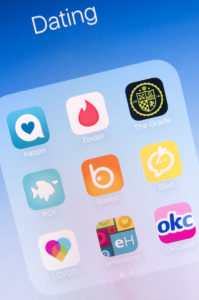** Lawsuits Against Website Owners under the ADA begin shifting to Accessible Video Content ** (more…)
Unruh
Fair in Love and War?
** Popular Match Making App Tinder Loses on Second Bite To Defeat Gender-Bias Class Action **
By: Brent E. Johnson

The popular geo-location dating application Tinder was rebuffed in its latest attempt to have a putative California class action complaint against it dismissed. Manapol. v. Tinder, No. BC589036, (Sup. Ct. L.A. County) (filed April 28, 2015). The complaint alleges that Tinder illegally discriminated against Plaintiff by charging him more than a similarly situated woman (for the Tinder Plus service) and therefore violated California’s Unruh Civil Rights Act. Id. Earlier this year, Plaintiff’s initial complaint was dismissed without prejudice for his failure to “connect the dots” on the facts. Id. (Order and Opinion, Feb. 17, 2016). The court held that Plaintiff’s complaint was built on his naked (pun intended) allegation that a female friend’s Tinder Plus bill was lower than his, which, (even if were true) was merely an isolated event and, therefore, insufficient to show a pattern of price discrimination based on gender. Plaintiff returned with an amended complaint alleging that the disparate pricing he experienced was not a one-off occurrence – but embedded in the algorithms at the heart of the functionality of Tinder Plus.
Superior Court Judge William F. Highberger rejected Tinder’s demurrer to this amended complaint, holding that Plaintiff’s allegations were adequately pled. Id. (Order and Opinion, July 21, 2016). In an oral argument (which we would have paid money to attend), the parties went back and forth with Judge Highberger over whether Tinder engages in gender discrimination with Tinder offering the declaration of a company employee that Tinder does not discriminate in its pricing for Tinder Plus or the number of free swipes a user gets on Tinder – and Plaintiff asserting he has his own contrary facts and will be able to obtain more evidence from Tinder. Clearly, a fight is brewing over the discoverability of Tinder’s trade secret algorithms.
The most surprising thing about this lawsuit for those who are unversed in California’s Unruh Civil Rights Act is that, even accepting the allegations as true, the complaint states a claim. Long before Ronald Bell of Kool & the Gang penned his immortal 1979 ballad (best performed by Jon Lovitz in the Wedding Singer), of the same name, “Ladies Night” was a ubiquitous part of American nightlife. But ironically, at about the same time the song reached its zenith at #8 on the Billboard Hot 100, a gentleman by the name of Dennis Koire was visiting Orange County car washes asking for the advertised “Ladies’ Day” discount and the Jezebel Nightclub in Anaheim demanding the “Ladies’ Night” reduced admission, all to no avail. The lawsuit he filed made it to the California Supreme Court in 1985, where the Court put the kibosh on Ladies Night in Koire v. Metro Car Wash, 40 Cal.3d 24 (1985), holding that such discounts violate the Unruh Act’s requirement that “[a]ll persons within the jurisdiction of this state are free and equal, and no matter what their sex . . . are entitled to the full and equal accommodations, advantages, facilities, privileges, or services in all business establishments of every kind whatsoever . . . .” Cal. Civil Code §51. Jezebel’s owner argued that the “social policy” exception applied in other Unruh Act cases was warranted in his case because “’Ladies Night’ encourages more women to attend the bar, thereby promoting more interaction between the sexes.” Koire, 40 Cal.3d at 33. The Court found this argument “not sufficiently compelling.” Id. Although such an argument is not likely to assist Tinder — if in fact it does gender discriminate as Plaintiff alleges — the California Supreme Court might want to reconsider its rejection of Jezebel’s social policy argument. In a world of millennials (and seniors!) looking for love on their laptop screens, there may be social utility in encouraging live interaction between Californians.
Do Payment Providers Have to Accommodate Everyone?
** Discrimination Class Action filed in California Alleging That Payment Providers such as Square and PayPal Violated Unruh law for Refusing to Process Merchant Payments for Merchant’s Risky Transactions ** . . .
By: Brent E. Johnson
Payment processors such as Square, Inc. and PayPal, Inc have opened up a new world for merchants who can now easily and inexpensively accept payments online and/or by credit card from anyone – anywhere. The platform, however, is not open to all-comers: the companies have strict policies on what sort of merchants or transactions they will accept – and those that they will not. For example, Square’s User Agreement prohibits merchants from using their accounts to accept payments for anything “illegal” – but it also prohibits a range of activities that may be legal but raise the risk profile for anyone involved (including the payment processor) such as transactions involving mail order drugs, gambling, firearms, adult material, hate products and drug paraphernalia. PayPal, Inc’s Acceptable Use Policy is similar, it prohibits using an account for activities that violate any law – but also legal (but legally risky) transactions such as get- rich-quick-schemes, lotteries, sexually orientated material, firearms and offshore banking. Plaintiff counsel in California have bought a purported class action alleging that such business regulations are “discrimination” under California’s civil rights statute (Cal. Civ. Code §§ 51 – 52) (aka “Unruh”). Abu Maisa Inc., v Flint Mobile Inc., No. 3:15-cv-06338 (N.D. Cal. December 31, 2015) ECF No. 1. In particular their named plaintiff is a convenience store owner, who, it is alleged, was dissuaded from using Square and PayPal (and other payment providers Flint Mobile, Google, Intuit and Stripe) because plaintiff’s store sells “banned” items such as adult magazines and lottery tickets. The case is an unusual one, in so far as Unruh cases are typically bought by plaintiff’s who have been discriminated against on the basis of some sort of disability or recognized protected classification (not just on the basis that a plaintiff was denied the right to, in this case, sell adult magazines). Plaintiff appear to have a hard road ahead of him. Notwithstanding the broad sweep of Unruh, California courts recognize that businesses may discriminate amongst customers in order to comply with legal requirements or protect business reputation (Harris v. Capital Growth Inv’rs XIV, 805 P.2d 873, 884 (Cal. 1991)) – as long as those regulations are rationally related to the services performed and the facilities provided. Marina Point, Ltd. v. Wolfson, 640 P.2d 115, 124 (Cal. 1982). For example, a rental car company can “discriminate” on the basis of age because of the risks involved in renting cars to younger drivers. Lazar v. Hertz Corp., 82 Cal. Rptr. 2d 368, 373 (Cal. Ct. App. 1999). Similarly, financial companies can make risk-oriented decisions regarding what customers to deal with and on what terms. Flower v. Wachovia Mortgage FSB, No. C 09-343 JF HRL, 2009 WL 975811, at *6 (N.D. Cal. Apr. 10, 2009). Courts uniformly “decline to second-guess [the defendant’s] business judgment.” Desert Healthcare Dist. v. PacifiCare FHP, Inc., 114 Cal.Rptr.2d 623 (Cal. Ct. App. 2001); Semler v. Gen. Elec. Capital Corp., 127 Cal. Rptr. 3d 794, 798 (Cal. Ct. App. 2011).

